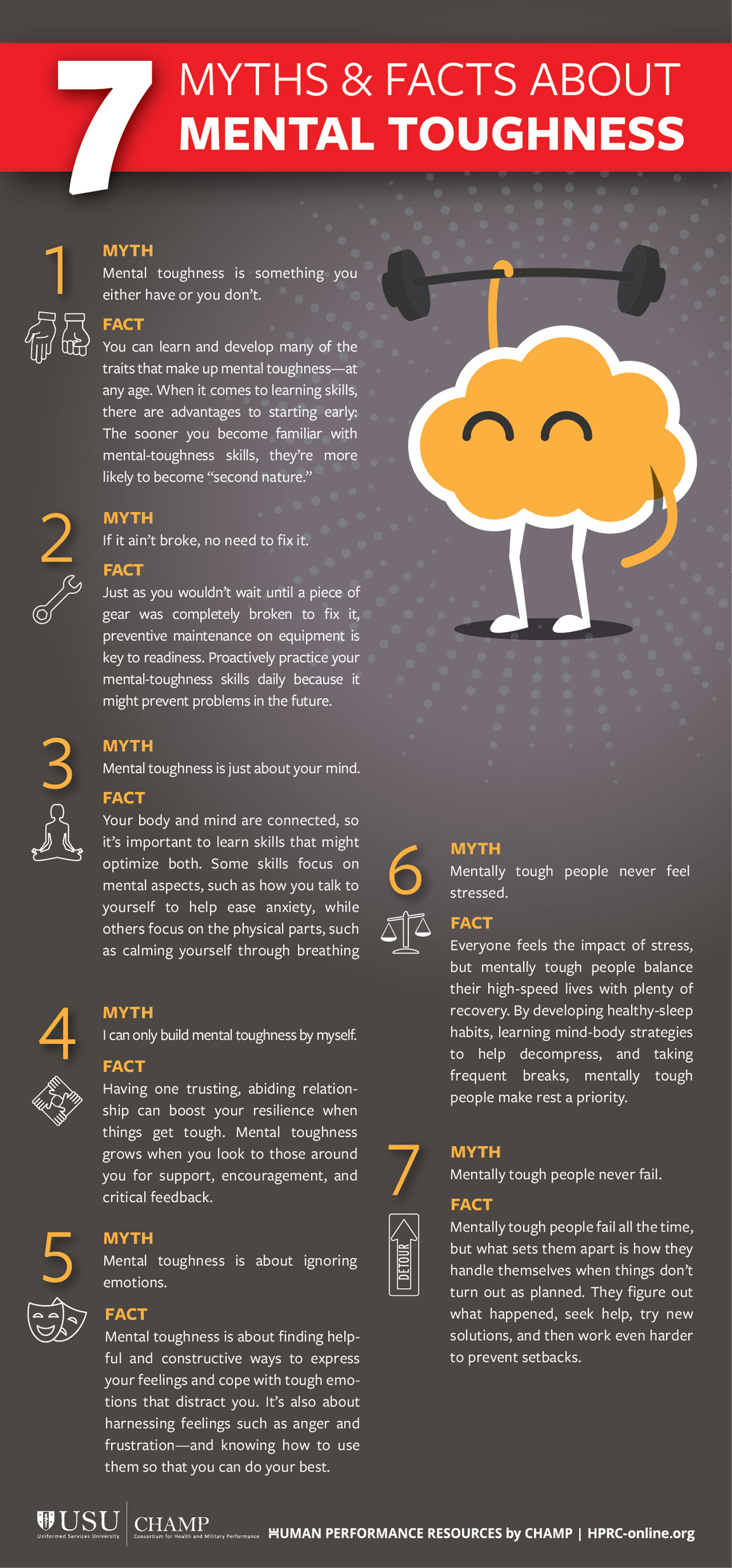Mental toughness is often described as a psychological edge that helps people endure challenges, overcome adversity, and achieve more success. There are many common myths about mental toughness that can influence your beliefs about where it comes from and your willingness to work at getting more of it. Big businesses, elite athletes, and now military leaders are interested in mental toughness because it helps you overcome challenges, achieve optimal performance, and maintain readiness. Check out these 7 common myths and facts about mental toughness.

- Myth: Mental toughness is something you either have or you don't. Fact: You can learn and develop many of the traits that make up mental toughness - at any age. When it comes to learning skills, there are advantages to starting early. The sooner you become familiar with mental-toughness skills, they're more likely to become "second nature."
- Myth: If it ain't broke, no need to fix it. Fact: Just as you wouldn't wait until a piece of gear was completely broken to fix it, preventative maintenance on equipment is key to readiness. Proactively practice your mental-toughness skills daily because it might prevent problems in the future.
- Myth: Mental toughness is just about your mind. Fact: Your body and mind are connected, so it's important to learn skills that might optimize both. Some skills focus on mental aspects, such as how you talk to yourself to help ease anxiety, while others focus on the physical parts, such as calming yourself through breathing.
- Myth: I can only build mental toughness by myself. Fact: Having on trusting, abiding relationship can boost your resilience when things get tough. Mental toughness grows when you look to those around you for support, encouragement, and critical feedback.
- Myth: Mental toughness is about ignoring emotions. Fact: Mental toughness is about finding helpful and constructive ways to express your feelings and cope with tough emotions that distract you. It's also about harnessing feelings such as anger and frustration - and knowing how to use them so that you can do your best.
- Myth: Mentally tough people never feel stressed. Fact: Everyone feels the impact of stress, but mentally tough people balance their high-speed lives with plenty of recovery. By developing healthy-sleep habits, learning mind-body strategies to help decompress, and taking frequent breaks, mentally tough people make rest a priority.
- Myth: Mentally tough people never fail. Fact: Mentally tough people fail all the time, but what sets them apart is how they handle themselves when things don't turn out as planned. They figure out what happened, seek help, try new solutions, and then work even harder to prevent setbacks.
Published on: September 11, 2020
References
Gucciardi, D. F., Jackson, B., Hodge, K., Anthony, D. R., & Brooke, L. E. (2015). Implicit theories of mental toughness: Relations with cognitive, motivational, and behavioral correlates. Sport, Exercise, and Performance Psychology, 4(2), 100–112. doi:10.1037/spy0000024
Reivich, K. J., Seligman, M. E. P., & McBride, S. (2011). Master resilience training in the U.S. Army. American Psychologist, 66(1), 25–34. doi:10.1037/a0021897
Weinberg, R., Freysinger, V., Mellano, K., & Brookhouse, E. (2016). Building mental toughness: Perceptions of sport psychologists. The Sport Psychologist, 30(3), 231–241. doi:10.1123/tsp.2015-0090
